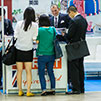EBC Automobile Committee working to facilitate car imports
- European car importers in Japan saw sales rise 17% in 2013
- Non-tariff barriers remain a focal issue in negotiations
- No foreign models qualify for kei car designation

Abenomics has been a mixed blessing for European automobile importers. Increasing consumer confidence and the wealth effect of higher stock prices have boosted sales of European cars. This has created new opportunities for premium British brands.
In 2013, sales by European Business Council (EBC) Automobile Committee members rose 17% to 265,000 units, while the market as a whole was flat. In anticipation of the increase in the consumption tax rate from 5% to 8% on 1 April, sales rose a strong 35% in the first quarter of 2014 to 85,000 units.
The depreciation of the yen resulting from the Bank of Japan’s ultra-loose monetary policy has, however, worsened the terms of trade for European automobile importers. In euro terms, the increased revenue from higher sales has barely been sufficient to offset the impact of the adverse movement in the euro–yen exchange rate.
The government of Prime Minister Shinzo Abe has pledged to revitalise the Japanese economy through structural reform and deregulation, but this does not yet extend to the automobile industry.
The non-tariff barriers to European imports, many of which were identified in the scoping exercise that preceded the launch of negotiations on a free trade agreement (FTA), continue to add to the cost of doing business in Japan for European importers of both passenger cars and commercial vehicles.
Now, 12 months after the start of the EU–Japan FTA negotiations, the European Commission is undertaking a review of Japan’s implementation of its commitment—given in the scoping exercise—to eliminate non-tariff barriers, in particular those relating to the car sector.
The EBC Automobile Committee’s assessment shows that Japan has indeed made progress in most, but not all, areas covered by the scoping exercise.
Progress has been mixed in the two areas of greatest interest to European car importers:
• Harmonisation with UN Regulations
The harmonisation of technical standards and certification procedures between the EU and Japan based on the mutual adoption of UN Regulations remains a top priority for European passenger car and commercial vehicle importers.
Spurred on by the approaching deadline for the implementation of the first phase of an International Whole Vehicle Type Approval System in March 2016, Japan has accelerated its adoption of UN Regulations in those areas where it does not accept a UN certificate as demonstrating compliance with Japan’s type approval requirements.
However, further progress is required.
• Kei cars
Kei, or mini, cars are a category of small vehicles unique to Japan. Such vehicles are restricted to a maximum length of 3.4m, a width of 1.48m, a height of 2m and an engine displacement of 660cc and below.
Kei cars benefit from lower automobile-related taxes, reduced automobile liability insurance fees and lower motorway tolls. They are also subject to less stringent overnight parking requirements.
No foreign model, including the BMW Mini, qualifies for kei car designation, an artificial construct of the Japanese regulatory system. The EBC Automobile Committee welcomes the first tentative steps that Japan has taken to align the taxation of kei cars and sub-compact cars.
But much more needs to be done to allow European sub-compact cars to compete on equal terms with kei cars.
Until the privileged fiscal and regulatory treatment of kei cars is removed, 40% of the Japanese passenger car market will remain ring-fenced from foreign competition.
During the first year, the negotiations with Japan have understandably focused on those non-tariff barriers identified in the scoping exercise conclusions. We recognise that this list was never intended to be definitive.
If the FTA negotiations continue, European car and commercial vehicle importers consider it imperative that the EU should introduce into the negotiations the elimination of other non-tariff barriers.
This will be essential to achieving the ultimate objective of the FTA negotiations—that a vehicle manufactured and type approved in the EU will be accepted in Japan without modification or further testing.




